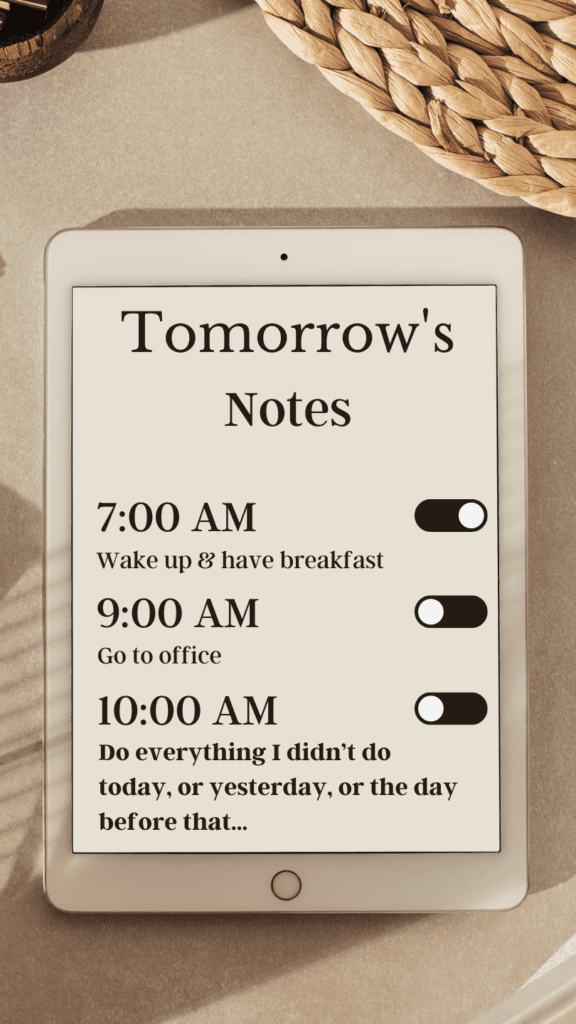Last Updated on February 29, 2024 by Christin
Adopting an “I’ll do it tomorrow” attitude often seems harmless in the moment, a simple postponement of tasks, dreams, or goals. Yet, the cumulative effect of such procrastination can be far-reaching, impacting not just productivity but also personal fulfillment and mental health.
Over time, this mindset transforms tomorrow into a future that never arrives, leaving a trail of missed opportunities and unfulfilled potential. The realization of how much life has passed by while waiting for the perfect moment to act can lead to profound regret and pain. It’s akin to waking up one day, only to discover that the tomorrows have run out, and many of the things you hoped to do remain undone.
Understanding Why We Put Things Of Until Tomorrow

The temptation to postpone tasks until tomorrow often stems from a desire to avoid immediate discomfort, choosing instead the fleeting pleasure of ‘present ease’ over future rewards.
This procrastination is deeply rooted in our emotional response to the task at hand; the idea of starting a challenging project or facing a daunting goal triggers a sense of overwhelm and anxiety.
In the short term, pushing these tasks to a later date provides a quick emotional relief, a release from the stress associated with them. This relief is akin to giving ourselves a momentary pause from life’s demands, allowing us to bask in a false sense of freedom from responsibility.
It feels good in the moment because it is an emotional coping mechanism—one that temporarily shields us from the perceived discomfort of our obligations, despite the long-term consequences of unchecked procrastination.
Effects of Putting Things Off Until Tomorrow
The cost of procrastination extends far beyond mere time wasted; it encompasses missed opportunities, stunted personal growth, and even deteriorating physical and mental health.
Obviously, delaying tasks reduces productivity and can lead to a pile-up of work, causing stress and anxiety. However, the less apparent consequences are often more detrimental.
Relationships may suffer as commitments go unfulfilled, and career advancements may stall due to the inability to complete projects on time or to a high standard.
On a personal level, the habit of putting things off can erode self-esteem and confidence, as individuals constantly feel like they’re falling short of their potential.
Furthermore, chronic procrastination can lead to a sedentary lifestyle, contributing to health issues such as obesity, cardiovascular diseases, and sleep disturbances.
Over time, the habit of postponing not only costs us in tangible losses but also in the quality of our lives, subtly undermining our happiness and well-being until it’s potentially too late to reverse the damage.
For instance, Tom, who constantly puts off paying his bills, may end up in debt and risk damaging his credit score. At the same time, he may feel immense stress and anxiety every time a due date approaches, ultimately affecting his mental health and making it harder to work and earn money to pay off the bills.
Similarly, Sarah’s habit of avoiding difficult conversations with her partner may lead to unresolved issues and a strained relationship. It could also prevent her from acknowledging and addressing any underlying issues that may be causing the tension in their relationship.
Strategies to Stop Putting Things Off Until Tomorrow
To combat the habit of putting things off until tomorrow and reclaim control over one’s time and achievements, adopting effective strategies is key.
Prioritize Getting Things Done
One fundamental approach is to recognize the intrinsic value of completing tasks. When you prioritize completing tasks because you know it’s beneficial for your growth, well-being, or happiness, you are less likely to procrastinate. Think about how much better you’ll feel after paying those bills on time or having that difficult conversation and resolving the issue with your partner.
Talk Like Someone Who Doesn’t Wait Until Tomorrow
If you want to stop saying ‘I’ll do it tomorrow’, utilizing affirmations can also serve as a powerful tool in reshaping one’s approach to procrastination. Positive self-talk, such as “I have the power to tackle my tasks efficiently,” can boost motivation and drive action. The effectiveness of affirmations lies in their ability to replace negative, self-limiting beliefs with empowering convictions, urging individuals towards productivity.
Affirmations could include:
- “Today is the opportune time to act, and I possess all the necessary skills and determination to complete my tasks efficiently.”
- “I am capable of overcoming challenges and obstacles, turning each task into a step towards my ultimate success.”
- “By focusing on the present, I harness my full potential to act decisively and accomplish my goals.”
- “Each task I complete on time strengthens my discipline and enhances my sense of achievement and self-worth.”
- “I control my time and actions; procrastination has no place in my path to success and fulfillment.”
Here are some more affirmations to stop procrastinating.
Hold Yourself Accountable
Accountability plays a crucial role in adhering to commitments. By sharing goals with a trusted friend, family member, or colleague, the responsibility of completing tasks becomes shared. This partnership not only provides an external motivator but also introduces an element of social encouragement.
For example, a weekly check-in with a mentor to discuss progress can significantly increase the likelihood of task completion.
Stop Putting Things Off Until Tomorrow
Taking action today sets the foundation for a better tomorrow. Every step you take towards accomplishing your goals not only brings you closer to achieving them but also builds a positive momentum that makes it easier to tackle subsequent tasks.
By acting promptly, you avoid the stress and anxiety associated with looming deadlines and unfinished projects.
Imagine the satisfaction and peace of mind you’ll experience knowing you’re on track, or even ahead, of your schedule.
Embark on your tasks today, no matter how small they are, and unlock the potential for personal growth, skill enhancement, and a sense of accomplishment that can only come from proactive engagement with your responsibilities.





